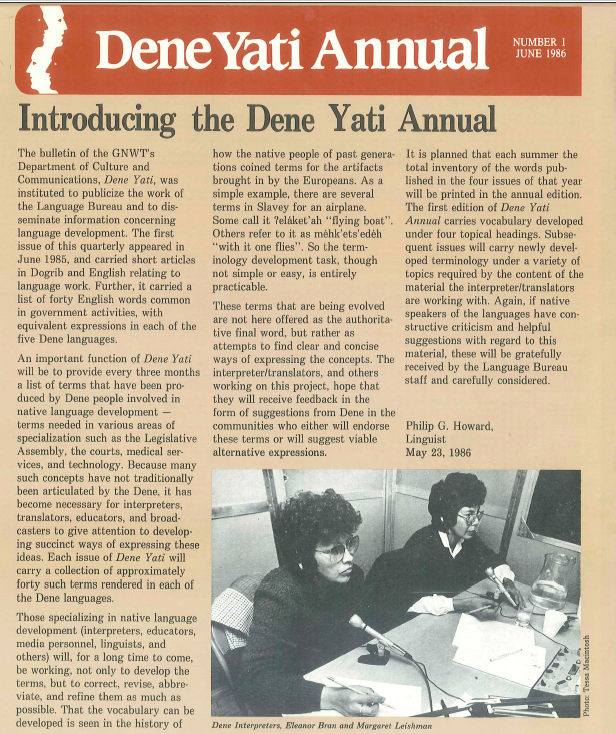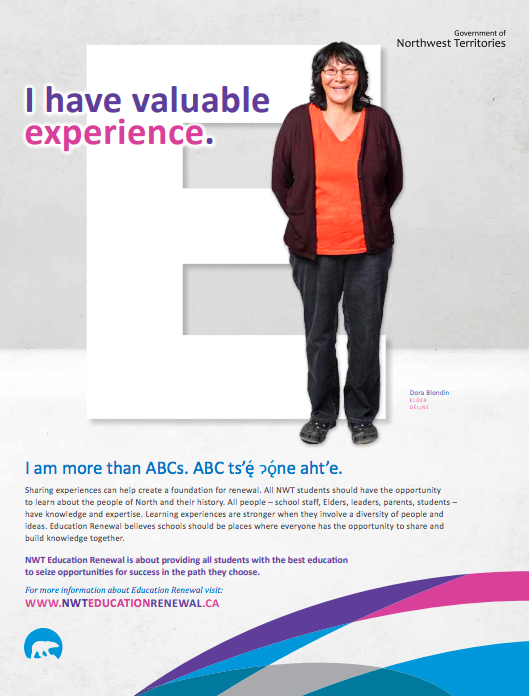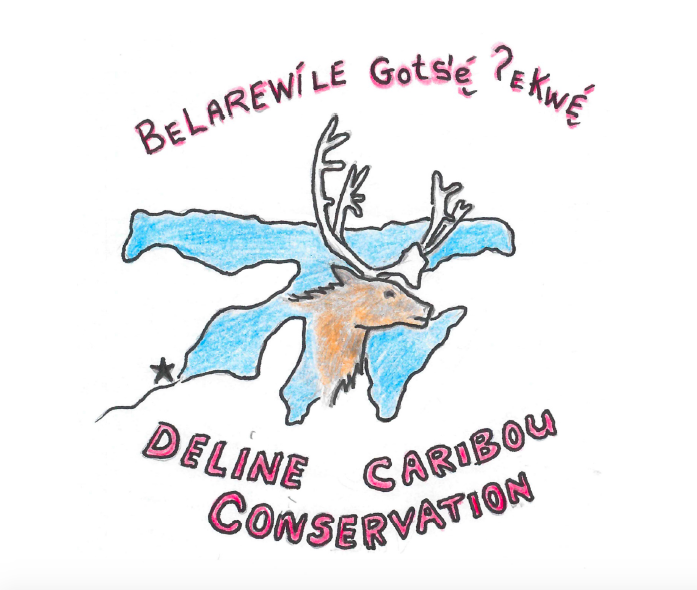Official Languages Act
The Northwest Territories Official Languages Act outlines the legal protections afforded to Chipewyan, Cree, English, French, Gwich’in, Inuinnaqtun, Inuktitut, Inuvialuktun, North Slavey, South Slavey, and Tłįchǫ̨. This includes the ability to use Official Languages in government institutions (legislative proceedings, for example) and the appointment of a Languages Commissioner to ensure the implementation the Act. Additionally, the Act outlines the duties of a Minister for Official Languages, including implementation and annual evaluation of Official Language programs, and regional consultation in the form of an Official Languages Board and an Aboriginal Languages Revitalization Board with representatives from each language community.
Read about the history of different versions of the Official Languages Act.
Read the reports on Official Languages from the Languages Commissioner of the NWT.
The Government of the Northwest Territories makes Annual Reports on Official Languages from the last decade available here: https://www.ece.gov.nt.ca/en/services/francophone-affairs-secretariat/official-languages-annual-reports. Older reports are archived with the Department of Education, Culture, and Employment.

Access this Resource
Official Languages Act, R.S.N.W.T. c O-1, 1988.
The Act is available to read on the justice.gov.nt.ca website.
Dene Yati
Following are some notes from each issue of Dene Yati, a newsletter issued by the GNWT Departmen of Culture and Communications.
June 1985:
This newsletter provides an overview of Athapaskan language family and discusses the advent of the Language Bureau. The new department initiated a project to make interpreting and translating services available in the five Dene languages found in the NT in 1982.
Expressed in the introduction to this issue is that problem that Dene languages “have not in the past been required to express closely defined concepts in the areas of technology, bureaucracy, government, medicine, law, and other domains” (1). To address this problem, interpreters from many organizations (e.g. CBC and the Dene nation) work through lists of words, “searching for the best ways of expressing the concepts succinctly and clearly in the native languages” (1).
A list of words and translations in each Dene language is presented next.
September 1985:
This issue of Dene Yati begins with a discussion of the role and responsibility of an interpreter/translator in the NWT. An article by Betty Harnum emphasizes the broad list of skills an I/T is asked to have in the NWT, moreso than anywhere else, including simultaneous interpretation, written translation, government translations, “relay interpreting,” (3+ languages) terminology development, typing, etc., across all subject areas. This is followed by a terminology chart, a traditional story called “The Old Lady in the Moon,” and a comment that Dene Nation funding cutbacks are making it difficult for interpreters to get training.
December 1985:
This third issue of Dene Yati discusses the different prefixes attached to body parts, and thus medical terminology, in each of the five Dene languages in the NT. This is followed by a Dene terminology list of body parts, and a series of short pieces about the Dene alphabet, standardization, and medical interpretation.
March 1986:
Issue 4 of Dene Yati opens with an overview of the Task Force on Aboriginal Languages, created “to make recommendations on the use, development, and promotion of the aboriginal languages in the Northwest Territories” (1). At the time of this issue, the task force had three Inuit and three Dene representatives. The organization did community consultations to examine people’s perspectives on first languages, and Fibbie Tatti co-chaired the Task Force. The committee’s recommendations are summarized in this issue as:
1. Native languages should be more widely used in communities and regions.
2. The Official Languages Act should be changed to include the right to use a native language in court, when receiving public services, and in the Legislative Assembly.
3. An office of Commissioners of Aboriginal Languages should be created to encourage the use native languages and to report to the Legislative Assembly. The Office of Commisioners of Aboriginal Languages should have both a Dene and an Inuit Language Commissioner.
4. A Ministry of Aboriginal Languages and Cultures should be created to develop and carry out policies regarding native languages. The Ministry should have both a Dene and an Inuit council.
5. The Ministry of Aboriginal Languages and Culture should be responsible for native language and culture curricula in schools; for government interpreters; for certifying N.L. teachers and interpreters/translators; and for cultural programs… The Ministry should also be responsible for ensuring the standardization of a Dene writing system so that children can learn both English and French and a native language in school and also learn about native culture.
6. The Education Act should be changed to guarantee bilingual education…
7. The GNWT should encourage employees to learn native languages.; provide jobs for bilingual people…
8. Native languages should be more widely used in the air transport industry; by the federal government; and on radio and television.
The issue also contains a terminology chart and several other articles about such topics as medical interpretation.
June 1986 (Annual):
This is a newsletter from the GNWT Department of Culture and Communications intended “to publicize the work of the Language Bureau and to disseminate information concerning language development” (1). This issue has an introduction to the newsletter written by Phillip Howard, a linguist. It then offers a chart of translations of English words (e.g. “Government words” on one page, “body parts” on another) in Chipewyan, Dogrib, Loucheux (Gwich’in) and North and South Slavey. It then has a chart of vowels, consonants, and dipthongs in different Dene languages.
June 1986:
Dene Yati Vol 2 No 1 begins by talking about the challenges interpreters face when trying to translate legal speech from English to Dene simultaneously, and the potential consequences of mistranslation. The terminology chart to follow, therefore, has law-themed words such as “custody” or “summons.” “Crown prosecutor,” for example, is translated to something like “verbal helper for police” in Dene.
September 1986:
This issue begins by talking about Government Finance terms and their Dene corollaries. It also has a personal overview of the life of a Dene broadcaster working for CBC. The quarterly terminology chart discusses financial translations.
December 1986:
This issue of Dene Yati opens with an article about the transition from hunting or gathering to wage labour and the importance of career planning from the Sir John Franklin School Guidance Counsellor. The theme of this newsletter’s terminology chart is career names, including for example, Consultant, Employment Officer, Eye Doctor, and Fisherman. It goes on to discuss challenges in the Fort Smith Region Language Bureau.
March 1987:
Dene Yati Number 4 opens with a conversation about difficulties in interpreting, including interpreting emotions or English idioms. A terminology table containing words for emotions is next, along with a story about Finding the Chinook, and a short article about Dene terms for technological developments.

Access this Resource:
Dene Yati is held at the NWT Archives, in the Department of Education Culture and Employment fonds (accession no. G-2003-001).
Dene Language Terminology Committee. Dene Yati. Northwest Territories Department of Culture and Communications Language Bureau, June 1985 - March 1987.
Nę K'ǝ Dene Ts'ı̨lı̨ Forum Terms of Reference
This document is a policy statement revising the terms of reference of the Sahtú Environmental Research and Monitoring Forum.
From text:
Many land-based projects and programs are underway in the Sahtú Region, with the involvement of various community, regional, territorial and federal departments as well as industry and academic partners. During a three-day interagency meeting in November, 2013, a consensus was reached that research and monitoring programs and projects should be well coordinated, with strong guidance from Sahtú communities. Governments and industry require research that will support wise, evidence-based decision-making.
As a consequence, Sahtú organizations and the Government of the Northwest Territories (led by the Department of Environment and Natural Resources) agreed to convene a group known as the “Sahtú Environmental Research and Monitoring Forum”. In 2017 a Dene name was adopted to reflect an expanded mandate for the Forum - Nę K’ǝ Dene Ts’ı̨lı̨ - meaning “living on the land.”
Access this Resource:
Click the link below.
NWT Education Renewal: I Am More than ABCs.
From the Education, Culture, and Employment website:
The “I am more than ABCs” campaign was created to:
- bring awareness and understanding to the work of NWT Education Renewal
- connect people to accurate information on Education Renewal so they can learn more
- showcase how important the work of Education Renewal is for many people, who have willingly agreed to be part of the campaign
The statement, "I am more than ABCs" means that while it is critically important to develop strong basics like literacy and math skills, learning is more than just letters and numbers. Wellness, safety, relationship building, strengthening culture, language and identity are all important parts of learning as well. When these elements are nurtured in a school and community, it drives students to explore and grow their learning even further. The campaign makes the link between the past and the future, and explores the meaning of learning that is relevant to a world that is constantly changing.
The campaign celebrates relationships with many education partners. Northerners were photographed from all walks of life, each demonstrating that education is more than a focus on “ABCs” alone.

Access this Resource:
Sahtu region posters are available at this PDF: https://www.ece.gov.nt.ca/sites/ece/files/resources/sahtu-8_5x11-english-lowres.pdf
Individual posters are also available: https://www.ece.gov.nt.ca/en/services/renouveau-en-education-aux-tno/sahtu-i-am-more-abcs-posters
Government of the Northwest Territories. “NWT Education Renewal: I am More than ABCs.” [Poster], Yellowknife, 2017.
Annual Report on Official Languages 2015-2016
Every fiscal year, the Government of the Northwest Territories issues a record of measures taken to implement the Official Languages Act. Each report details developments in both French and Aboriginal language programming. Many programs focus on connecting youth with elders, training teachers, developing curriculum, and providing government services in as many languages as possible.
Some events from this reporting period:
- Describes language plan and notes that ECE is currently working on an updated version for 2015-2020.
- The North Slavey member of the Official Languages Board was Theresa Etchinelle, with Jane Modeste as alternate. For the Aboriginal Language Revitalization Board, it was Dora Grandjambe with Anne Kochon-Orlias as alternate.
- The boards are currently developing a process for amalgamation, which will require amendments to the Official Languages Act.
- The report summarizes the TRC Calls to Action specific to language and culture. It identifies points that it is already undertaking and commits to calling on the federal government for Aboriginal language revitalization funding.
- It then presents one page summaries of each language region’s five year plan, with updates and highlights of 2015-16.
Access this Resource:
The Government of the Northwest Territories makes reports from the last decade available here: https://www.ece.gov.nt.ca/en/services/francophone-affairs-secretariat/official-languages-annual-reports
Government of the Northwest Territories. Annual Report on Official Languages. Yellowknife: 2016.
Belare Wı́le Gots'ę́ Ɂekwę́ - Caribou for All Time: A Délı̨nę Got’ı̨nę Plan of Action
This is a traditional Caribou management plan, approved by Délı̨nę First Nation, Land Corporation and Ɂehdzo Got'ı̨nę. It is the first plan of its kind in Canada. After a formal public hearing, the plan was also approved by the SRRB and subsequently by the GNWT Minister of Environment and Natural Resources.

Access this Resource:
This resources is available elsewhere on the SRRB Website. Or, download the PDF from the attachment at the bottom of this page.
Délı̨nę Ɂekwę́ Working Group. Belare Wı́le Gots’ę́ Ɂekwę́ – Caribou for All Time. Délı̨nę : Délı̨nę Ɂekwę́ Working Group, 2016.
Annual Report on Official Languages 2014-2015
Every fiscal year, the Government of the Northwest Territories issues a record of measures taken to implement the Official Languages Act. Each report details developments in both French and Aboriginal language programming. Many programs focus on connecting youth with elders, training teachers, developing curriculum, and providing government services in as many languages as possible.
Highlights from 2014-2015:
The Sahtu Dene Council organized numerous cultural and on-the-land programs, such as seasonal hunts, spiritual gatherings and culture camps. All of these provide opportunities for youth to learn from Elders about traditional knowledge and customs as well as learn their language. Dene Literacy Classes were conducted, as were regular language classes at all four schools in the region. The SDC also recorded and distributed 200 USB Drives (memory sticks) with Elders’ stories.
Access this Resource:
The Government of the Northwest Territories makes reports from the last decade available here: https://www.ece.gov.nt.ca/en/services/francophone-affairs-secretariat/official-languages-annual-reports
The 2014-2015 report PDF is available here: https://www.ece.gov.nt.ca/sites/ece/files/resources/official_languages_report_2014-15.pdf
Government of the Northwest Territories. Annual Report on Official Languages. Yellowknife: 2015.
Where the Rivers Meet: Pipelines, Participatory Resource Management, and Aboriginal-State Relations In the Northwest Territories
Excerpt from Summary:
Oil and gas companies now recognize that industrial projects in the Canadian North can only succeed if Aboriginal communities are involved in the assessment of project impacts. Are Aboriginal concerns appropriately addressed through current consultation and participatory processes? Or is the very act of participation used as a means to legitimize project approvals? Where the Rivers Meet is an ethnographic account of Sahtu Dene involvement in the environmental assessment of the Mackenzie Gas Project, a massive pipeline that, if completed, would transport gas from the western subarctic to Alberta, and would have unprecedented effects on Aboriginal communities in the North. Carly A. Dokis reveals that while there has been some progress in establishing avenues for Dene participation in decision-making, the structure of participatory and consultation processes fails to meet expectations of local people by requiring them to participate in ways that are incommensurable with their experiential knowledge and understandings of the environment. Ultimately, Dokis finds that despite Aboriginal involvement, the evaluation of such projects remains rooted in non-local beliefs about the nature of the environment, the commodification of land, and the inevitability of a hydrocarbon-based economy.
Access this Resource:
Dokis, Carly A. Where the Rivers Meet: Pipelines, Participatory Resource Management, and Aboriginal-State Relations In the Northwest Territories. Vancouver: UBC Press, 2015.
Read the Google Book Preview
Annual Report on Official Languages 2013-2014
Every fiscal year, the Government of the Northwest Territories issues a record of measures taken to implement the Official Languages Act. Each report details developments in both French and Aboriginal language programming. Many programs focus on connecting youth with elders, training teachers, developing curriculum, and providing government services in as many languages as possible.
Highlights from 2013-2014:
Three Sahtú Communities had language nests (Délįne, Tulíta and Fort Good Hope). Teaching and Learning Centres continued (from previous years) to develop Dene Kedǝ curriculum implementation guides. An important legislative change was enacted: “Members of the Legislative Assembly may use any of the Aboriginal languages in the debates and other proceedings of the Assembly. This services is also extended to the members of the Youth Parliament and the Elders Parliament” (15). The Sahtú Dene Council distributed a dictionary for language learning in Fort Good Hope, and "offered cultural activities within the Sahtú region between the youth and Elders by practicing speaking through on the land activities.”
Access this Resource:
The Government of the Northwest Territories makes reports from the last decade available here: https://www.ece.gov.nt.ca/en/services/francophone-affairs-secretariat/official-languages-annual-reports
The 2013-2014 PDF is available here: https://www.ece.gov.nt.ca/sites/ece/files/resources/official_languages_report_2013-14.pdf
Government of the Northwest Territories. Annual Report on Official Languages. Yellowknife: 2014.
A View into the Sahtú: Land Claims and Resource Development
This thesis focuses on the Sahtú land claim process. It unpacks the impact of the agreement twenty years after its signing, the role that the land claim is playing in self-government negotiations, and its utility for managing natural resource development. Most of the field research informing this thesis was conducted in Norman Wells. Interviewees saw community-level resource management as less bureaucratic than larger regional (or Dene Nation-wide) organizational structures. However, overlapping jurisdictions in Tulı́t’a and K’asho Gotine are now making self-government negotiations more complicated.
Access this Resource:
Collections Canada has made this thesis available on their website.
When searching for the thesis, note that Sahtú is sometimes spelled Sahtu.
Smart, Miles. A View into the Sahtú: Land Claims and Resource Development. Master’s Thesis, Concordia University, 2014.


 Phone: 867-374-4040
Phone: 867-374-4040 Email:
Email: